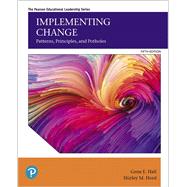
Note: Supplemental materials are not guaranteed with Rental or Used book purchases.
Purchase Benefits
Looking to rent a book? Rent Implementing Change Patterns, Principles, and Potholes [ISBN: 9780135258231] for the semester, quarter, and short term or search our site for other textbooks by Hall, Gene E.; Hord, Shirley M.. Renting a textbook can save you up to 90% from the cost of buying.
Part I: Two Basics of Implementing Change: Assumptions & Interventions
1. What Key Patterns and Lessons Have We Learned About Implementing Change: Change Principles
2. What Actions and Events Are Key to Facilitating Change Processes: Interventions
Part II: The Three Diagnostic Dimensions for Assessing Change: Concerns, Using, and Fidelity
3. What is "It?": Innovation Configurations
4. How Can the Different Feelings and Perceptions About Change Be Understood and Addressed: Stages of Concern
5. How Do Behavioral Profiles Evolve as Implementers Progress from Not Using to Expert: Levels of Use
Part III: Leading Change Across the Organization
6. How Do Leaders Make a Difference in Implementing Changes: Change Facilitator Style
7. How Can the Organization's Culture Support Implementing Changes: A Culture of Continuous Improvement
8. What is a Part of the Change Process That Is Not Controlled by the Leaders or the Followers: Intervention Mushrooms
Part IV: Different Perspectives for Understanding the Big Picture of Change: Systems, Diffusion, and Organization Development
9. How Can Understanding the Interconnections of Parts that Make a Whole Affect the Success of Change Efforts: Systems Thinking
10. How Do Communication Activities and Change Agents Affect the Change Process: The Diffusion Perspective
11. In What Ways Can Team Member Skills and Process Consultants Affect Implementation: Organization Development (OD)
Part V: Combining Views: Perspectives, Constructs, Tools, Applications, and Implications
12. How Can Change Science Constructs Be Combined to Understand, Assess, and Lead Efforts to Implement Change: Data-Based and Conceptual Examples
Appendix A: Example Interventions for Each Stage of Concern
Appendix B: The One-Legged Interview (OLI)
Appendix C: Stages of Concern Questionnaire (SoCQ) (Form 075)
Appendix D: Stages of Concern Questionnaire (SoCQ)Scoring Device
Appendix E: Levels of Use of the Innovation (Operational Definitions)
Appendix F: Six Dimensions of Change Facilitator Style
Appendix G: Change Facilitator Style Questionnaire (CFSQ)
Appendix H: Change Facilitator Style Questionnaire (CFSQ) Scoring Device
Appendix I: Poisonous Mushroom: The Poltergeist and the Missing Tables
The New copy of this book will include any supplemental materials advertised. Please check the title of the book to determine if it should include any access cards, study guides, lab manuals, CDs, etc.
The Used, Rental and eBook copies of this book are not guaranteed to include any supplemental materials. Typically, only the book itself is included. This is true even if the title states it includes any access cards, study guides, lab manuals, CDs, etc.